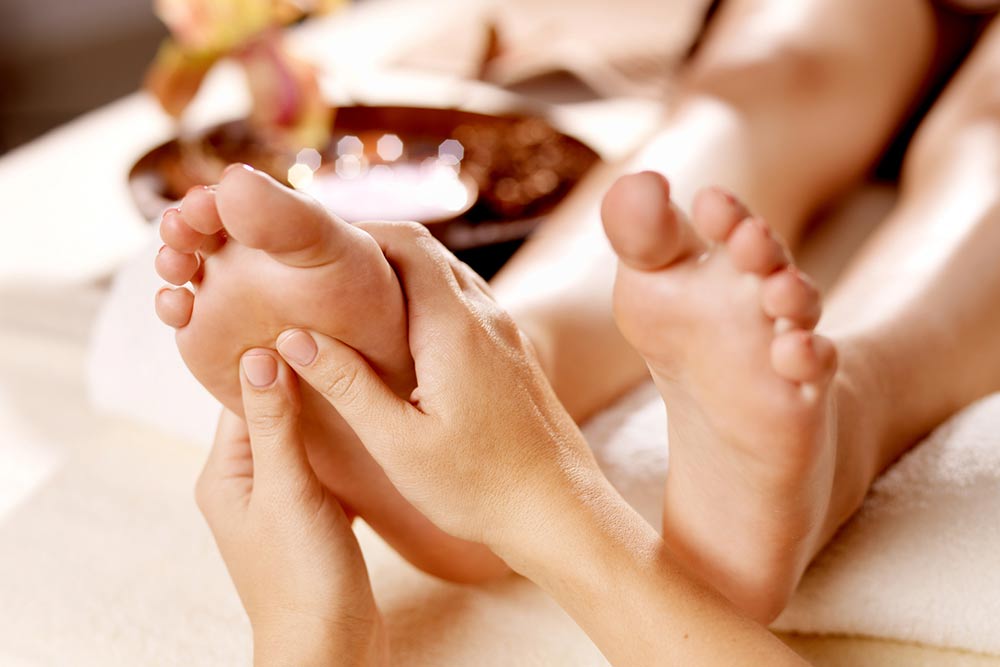12 surprising health benefits of a foot massage

Self-care, be it for health or any other reason, is important. While the hair and face get ample care, the feet are often not looked after as much as they deserve. One effective way to boost overall health is through a foot massage. A good foot massage can have many health benefits besides relaxation and reduced stress levels. Here’s why foot massages should be incorporated into one’s self-care routine:
1. Boosts blood circulation
The type of work most people do nowadays requires them to sit at their desks for hours on end without much movement. Due to a sedentary lifestyle and little to no regular exercise, there is a lack of muscle movement in the feet. Moreover, uncomfortable shoes block blood circulation in the feet, leading to muscle stiffness and foot pain. A 10- to 15-minute foot massage session before bed helps improve blood circulation. Regular foot massages stimulate blood flow and increase circulation, thereby retaining muscle strength.
2. Keeps the feet healthy
One of the main benefits of a foot massage is healthy feet. Regular massages will make spotting foot problems such as sores, ingrown toenails, dry and cracked heels, and corns easy. Weekly massages can help keep the feet moisturized. Calloused feet can be incredibly painful and affect the way one walks.
3. Maintains blood pressure levels
Blood pressure problems have become a common health issue. Unhealthy eating habits, stress, and genetic and environmental factors are some of the major causes of high blood pressure. A foot massage targets the main acupressure points in the feet that help improve blood pressure levels and help lower stress, too.
4. Reduces stress levels
A foot massage can help relieve stress. The feet have numerous pressure points that are connected to different parts of the body. Massaging and triggering these points correctly can help relieve muscle tension and lower stress levels. All in all, a relaxing foot massage helps improve mental health by reducing cortisol levels in the body.
5. Boosts emotional well-being
A foot massage can help release serotonin and endorphins, enhancing mood and boosting overall health. So, if someone is feeling low and tired, a foot massage can help relieve the stress and boost their spirits.
6. Stimulates nerve function
There are many nerve endings in the feet. A foot massage is a great way to stimulate these nerves, resulting in better nerve function. This is a very important and remedial measure for those with diabetes, too, as improved nerve function helps alleviate neuropathic symptoms in conditions such as diabetes.
7. Improves sleep
It is seen that regular foot massages help boost sleep quality. By stimulating the nervous system, a foot massage can help alleviate sleep disorders and insomnia symptoms. One of the best times to get a foot massage is before bed, as it gives the body more time to relax afterward.
8. Alleviates symptoms of peripheral neuropathy
Peripheral neuropathy is a condition where the nerves outside the spinal cord and brain are affected. It causes numbness, weakness, and pins-and-needles sensations in the hands and feet. One of the common causes of this condition is diabetes. Regular or weekly foot massages can relieve the condition’s symptoms by providing nerve and blood circulation.
9. Helps manage migraines and headaches
Reflexology is a therapeutic massage that suggests certain reflex points on the feet are connected to the head. When stimulated, these specific reflex points help manage migraines and headaches. Studies show that when migraine patients were given reflexology foot massages coupled with balanced meals, they were able to get relief from migraine headaches and their associated symptoms.
10. Improves digestion
Another benefit of reflexology is improved gut health and digestion. Certain reflex points in the feet are connected to the digestive system, and a good foot massage can help improve digestion and boost gut health, including issues such as bloating and ingestion.
11. Alleviates edema due to pregnancy
Pregnancy causes fluid retention in the feet and ankles, and this condition is known as edema. It is a common condition in pregnant women, especially in the last trimester, and it can be easily managed with a foot massage daily. Good rest, the right nutrition, and a daily relaxing foot massage can help reduce the effects of edema during pregnancy.
12. Helps prevent foot and ankle injuries
Muscle soreness, joint pain, and foot and ankle injuries can be reduced with the help of a good foot massage. Combined with light ankle and foot exercises, massaging the feet can help strengthen the foot and ankle. This will help prevent future injuries as well.
Treating oneself with a foot massage is a therapeutic and relaxing approach to maintaining overall physical and mental well-being. Whether someone needs better sleep quality or improved blood circulation, a relaxing foot massage can help manage several problems. So, taking care of the feet must be a priority as much as the other parts of the body.









